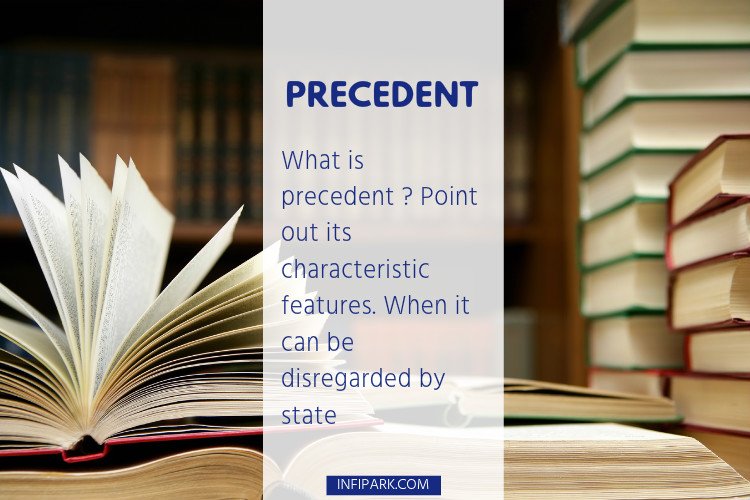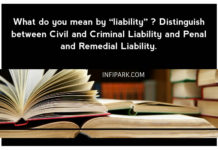What is precedent ? Point out its characteristic features. When it can be disregarded by state ?
Ans. Judicial precedent is another important source of law. It is a distinguishing feature of the English legal system since most of the common law is unwritten and owes its origin to judicial precedents. Precedents have a binding force on judicial tribunals for deciding like-cases in future. In continental countries such as Germany France, Italy, Judicial Precedent has only instructive value and it is not authoritative. Its importance is no greater than that of a text book of law. On the other hand, in English legal system, it has authoritative importance and is, in fact, a legal source of law which the courts are bound to follow.
According to Salmond the doctrine of precedent has two meanings, namely :
(1) in a loose sense precedent includes merely reported case-law which may be cited and followed by the courts.
(2) in its strict sense Precedent means that case-law which not only has a great binding authority but must also be followed. Holdsworth supports the doctrine in its loose sense. More recently, the value of the doctrine of Precedent has become a debatable issue. There is no dissatisfaction with the practise of citing cases and attaching weight to them, the difference of opinion, is as to the present practice of treating precedents as absolutely binding.
Precedent as a source of law.—Precedent has a binding force and, therefore, it is an important source of law. Expressing his views on precedents Blackstone pointed out that it is an established rule to abide by the former precedents where the same points come again in litigation. They also keep the scale of justice, even and steady and not liable to be waived away with every new judge’s opinion. Justice Cardozo also supports the view that adherence to precedents should be the rule and not an exception. The rule of precedents should, however, be abandoned if it is inconsistent with the sense of justice or derogatory to social, welfare policy. The practice of precedents has gained favour with English Courts be-cause it leads to certainty of law and also predictability of decision is always preferable to approximation of ideals. Again, it enables illogical and unsatis factory decisions to be overruled to meet the ends of justice.
Nature of judicial precedents.—A judicial precedent is purely constitutive in nature and never abrogative. This in other words means that it can create law but cannot abolish it. The judges are n9t at liberty to substitute their own views where there is a settled principle of law. They can only fill in the gaps in the legal system and remove imperfections in the existing legal system.
Definitions of Precedents
(a) Gray.—A Precedent covers everything said or done which fur-nishes a rule for subsequent practice.
(b) Keeton.—A ‘judicial precedent’ is a judicial decision to which authority has, in some measures, been attached.
Classification of Precedents.—Of precedents described as step-ping stones and not halting places, many arbitrary distinctions have been made. But for our present purposes we shall take into consideration the following kinds of precedents :—
(1) Declaratory and Original Precedents,—It has already been pointed out in this Chapter that judicial decisions are of two types, namely, those which create a new law and those which apply to only known and settled principles of law to the particular facts of the case for decision. Decision of both kinds function as precedents, because the legal prin-ciples embodied therein are authoritative guides to courts in the determi-nation of future controversies. But a declaratory precedent is not a source of new law, whereas original precedent is generally speaking, there are quite good number of declaratory precedents, for on most points the law is already settled and judicial decisions are mere declarations of pre-existing rules. On the other hand, original precedents, though lesser in number, are greater in importance, for they alone develop the law.
(2) Authoritative and Persuasive Precedents.—An authoritative precedent is that which judges must follow irrespective of whether they approve of it or not. It is binding upon them and excludes their judicial discretions for. the future. Authoritative precedents recognised as legal sources of law are the decisions of the superior courts of justice in En-gland. In India a judicial precedent of the Supreme Court is authoritative in connection with the High Courts and other subordinate courts, whereas a judicial precedent of a particular High Court is authoritative only within the jurisdiction of the High Courts.
Authoritative precedents have generally been classed as absolutely authoritative precedents or conditionally authoritative precedents. The former are deemed as absolutely binding and therefore, to be followed even if they appear to be erroneous, with certain exceptions, the absolute authority of precedents in England existin the following three cases viz.
(1) That the House of Lords is absolutely bound by its own decisions.
(2) That the Court of Appeal is bound by its own decisions and by those of the court of co-ordinate authority,
(3) That every court is absolutely bound by the decision of the court superior to itself.
(3) Conditionally authoritative precedent.—It is that which though normally binding on the courts is likely to be disregarded in certain circumstances. While defining a conditionally authoritative precedent, Salmond said : “In all ordinary cases it is binding, but there is one special case in which its authority may be lawfully denied. It may be overruled of dissented from, when it is not merely wrong but so clearly and seriously wrong that its reversal is demanded in the interests of the sound administration of justice. Otherwise it must be followed, even though the court which follows it is persuaded that.it is erroneous or unreasonable. The chief difference thus between the absolutely authoritative precedent and conditionally authoritative precedent is that the former is absolutely binding and, therefore, cannot be set aside unless it has been overruled by a Statute or there is a conflicting Precedent of equal authority or of a superior court, whereas the latter is that, that is binding on the courts, unless it is too seriously wrong that its reversal is needed in the administration of justice.
Effect of time on Precedents.—Salmond says that other things being equal a precedent acquires added authority from the lapse of time. A decision, which might be lawfully overruled, without hesitation while yet new, may, after the lapse of a number of years acquire such increased strength as to be practically of absolute, authority and no linger of merely conditional authority.
But lapse of time need not always add authority to a precedent. It may sometimes have the opposite effect. If a precedent has not been subsequently acted upon for a long time, if it is not in harmony with the current ideas. To revive such a precedent, may also do as much injustice as the overruling of a well established rule.
















